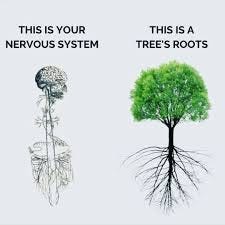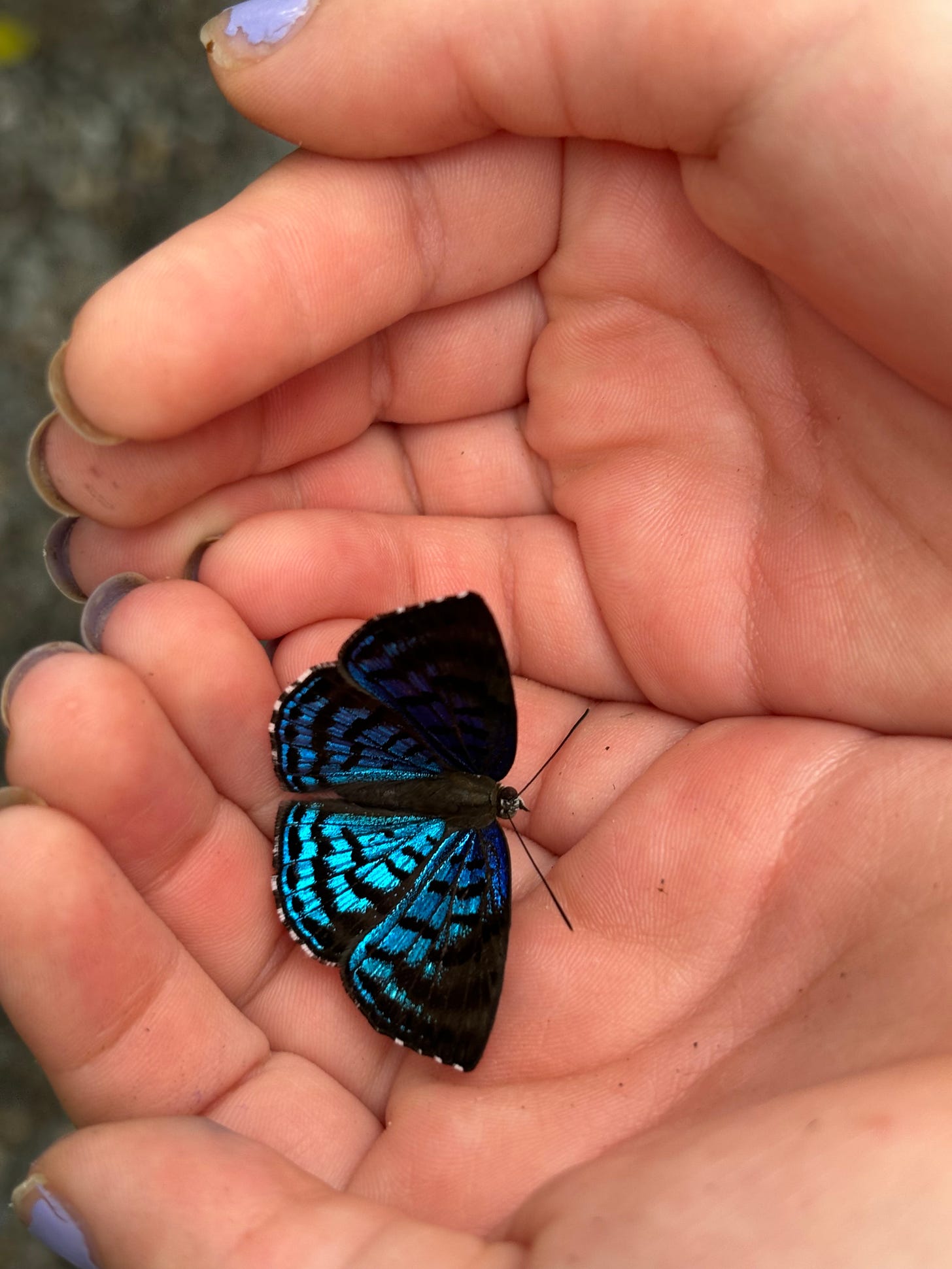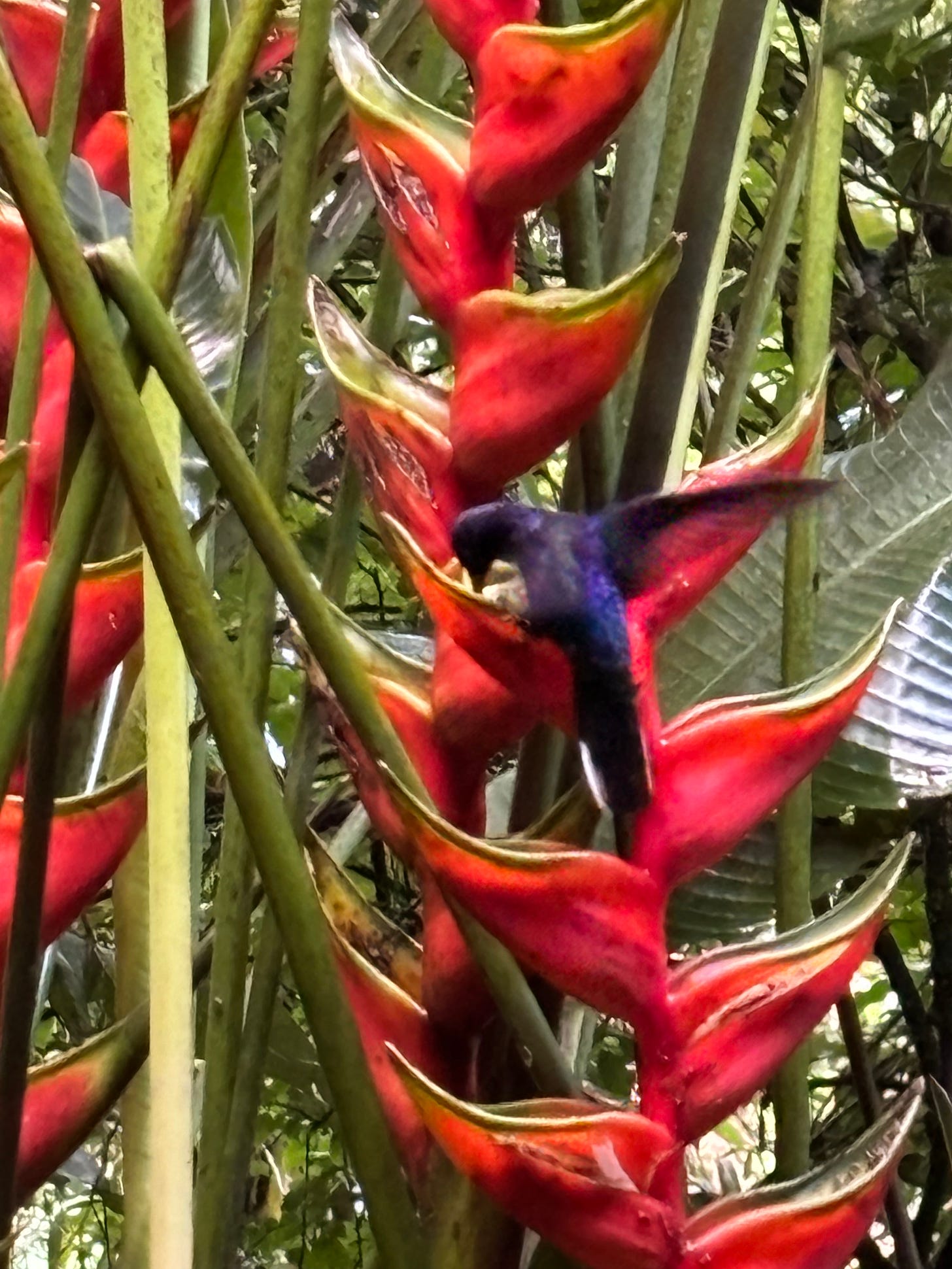“Paying attention is a form of reciprocity with the living world, receiving the gifts with open eyes and open heart.”
-Robin Wall Kimmerer, Braiding Sweetgrass
Listen,
Dwell.
Receive,
Give.
Gratitude,
Joy.
This has been my gatha (short phrase used in mindfulness practice to focus the mind; a reminder) this week as I have been recalibrating and co-regulating my nervous system in the forest at Rancho Margot, a regenerative farm and ecolodge at the base of Volcán Arenal, near the lake and alongside the Caño Negro river.
I was guided to Rancho Margot through synchronicity and intuition. I had been looking at different locations around the beach, because Daphne loves to go to the beach and we were looking to travel with a friend during the school holidays. On my walk to Honey Sol Somatics the other week, the thought occurred to me that I should look around La Fortuna area, since it’s rainy season and the beach weather isn’t great but swimming in hot springs could be. After my reiki session, Sydney said, “The only thing that came up for me was that you should look around La Fortuna for your vacation.” So I did, searching for kid-friendly places, and Rancho Margot came up. It was truly everything I hoped for and more, probably my favorite place I’ve visited in Costa Rica so far.
Being immersed in the sound of rain drips, birdsong, and river rushing was deeply healing. As soon as we arrived, basking in the symphony and away from traffic and bustle, I could feel my nervous system resetting, calming, co-regulating with the forest. When you see this artistic rendition of a tree and our nervous systems, it makes sense that being among the trees is so deeply healing. Our nervous system and tree root systems are fractals, patterns that repeat themselves throughout nature.
Much like a parent needs to stay calm to help co-regulate with their child when they are upset and dysregulated, so can we co-regulate with our Mother Earth. The earth is our parent, and we are the earth, and our nervous system is part of this deeper, more expansive intelligence. Our own emotions can be overwhelming, and when we can remember we are a part of this wider whole, the earth can help hold them with us, making them lighter, helping them dissipate, helping us regulate.
The function of the nervous system is to send messages back to the brain to tell our bodies what to do. If we can imagine our nervous system to be larger than ourselves, extending into the earth, perhaps we can tap into the wider deeper and wider intelligence we are a part of, receiving signals about how to be in better relationship, how to take more skillful actions.
Can we see and feel how our nervous system is an extension of the earth’s?
Can we see and feel into this connection, and might this co-regulation be part of the work we need to do right now for a more livable world for all?
When we arrived, I wrote a little note:
Dear forest, my hope in these 5 days is that I can give as much to you as you give to me
through my paying attention
through my writing
through singing.
Reciprocity is a theme that has been coming up in a lot of conversations lately, such as with students in regards to their research. Reciprocity is relational and collective. I love this explanation from McGarry et al (2021):
Reciprocity should not be treated as something sought in each and every connection, but as something that will come, in time, from the network (p. 209)1.
Being acculturated in capitalism, we might think of reciprocity in a transactional way - as something that should happen within each relationship directly - or we might mistake transaction for reciprocity. But reciprocity is bigger than any one relationship. It is a practice of giving generously and trusting that we will receive when we need from the wider web of relationships.
I’ve been trying to practice reciprocity with the forest, through attention, writing, singing, and care (we did a trash clean-up a few weeks ago at the UPEACE forest which is a story for another time). You don’t have to try- it is already happening- but it feels like there is something valuable in putting my attention there.
In Braiding Sweetgrass, Robin Wall Kimmerer talks about attention as a form of reciprocity. She writes, “Paying attention is a form of reciprocity with the living world, receiving the gifts with open eyes and open heart.” In this spirit, I offer you a short guided meditation I’ve been practicing with here (feel free to use, adapt, share with attribution, as always :).
Meditation script:
Listening, dwelling
Breathing in, I listen to the forest
Breathing out, gratitude to the forest.
Breathing in, I listen deeply to the sounds of life around me- the thunder, the rain, the birdsong, the insect buzz.
Breathing out, I dwell in the symphony of life’s music.
The roar and rush of the river in the distance
Everything alive, singing.
Breathing in and out, I listen to the song of life, and I dwell in gratitude.
I let the sounds wash through me, clearing me. I rest my attention with this music.
Giving, receiving
Breathing in, I know I am breathing with the forest. I receive my breath from the forest.
Breathing out, I offer my breath to the forest.
Breathing in, I receive.
Breathing out, I offer.
Through each breath, we become each other.
I feel my heart connected with the earth’s heart.
With my attention on the breath, I am aware that my life and the forest are intertwined. The forest is giving me life, and I offer my breath and my attention in return. I receive oxygen and I return carbon dioxide. We are each other’s lungs, and I rest my attention in the joy and beauty of this reciprocal dance.
Watering seeds of joy
Breathing in, I know I am breathing with the forest,
Breathing out, I am so happy to be breathing with the forest.
Knowing I am breathing with the forest waters my seeds of happiness.
I know I am here,
And I am so happy we are here together.
I enjoy every breath I get to take with this forest.
With each breath, I touch the joy of being alive.
There can be misconceptions that meditation needs to be long or lead to esoteric peak experiences. While all of that is well and great, I appreciate that my teacher Thich Nhat Hanh emphasizes the micromoments of meditation- the pause, the bell, this breath, right here. Meditation is ultimately about coming back, again and again. A longer sitting practice absolutely supports this, and I can’t recommend this enough. Regular consistent daily meditation will change your life, I promise. But the micromoments, this breath right here, are just as important. Both practices - longer sitting and micromoments - make each other possible.
Another practice I love that I’ve learned in the Plum Village tradition is watering seeds of joy and happiness (and any other feelings you want to experience more of). The practice is simple, and based on the understanding that we all contain all the seeds or mental formations in our consciousness, such as happiness, joy, fear, anger, etc. As a practice, we try to avoid watching the seeds we don’t want to water- not watching toxic TV shows, for example. And we actively try to do things that water what we do want to water- things that bring us joy, for example. When you have an experience of one of these feelings, you try to notice and dwell in it - not in a grasping or clinging kind of way, but in a dwelling and appreciating kind of way. These are subtle differences, and it’s a rich practice.
The sentiment of attention and writing as reciprocity are conveyed in this poem by Mary Oliver:
Instructions for living a life.
Pay attention.
Be astonished.
Tell about it.
In Braiding Sweetgrass, Robin Wall Kimmerer also writes about how writing can be a form of reciprocity with the living world. Here are two of my favorite passages where she writes about this:
Asking what is our responsibility is perhaps also to ask, What is our gift? And how shall we use it?…We may not have wings or leaves, but we humans do have words. Language is our gift and our responsibility. I’ve come to think of writing as an act of reciprocity with the living land. Words to remember old stories, words to tell new ones…2
For me, writing is an act of reciprocity with the living world; it is what I can give back in return for everything that has been given to me. And now there’s another layer of responsibility, writing on a thin sheet of tree and hoping the words are worth it.3
Right now, I am writing on a laptop that contains minerals that are sourced with great environmental and human harm. No words feel like they could ever be worth this cost. In co-regulating our nervous system with the earth, might this deeper intelligence guide us towards ways of offering our gifts that are more generative and less harmful? Ways we can connect and share that don’t require destruction somewhere?
Yet, I continue to hope that my writing might be an act of reciprocity, even given imperfect technologies which allow me to reach you. It is an act of reciprocity with creative life force energy, as I have written about previously, and it is an act of conveying my love for the world - this is the heart of Enchantable - which I hope might have some benefit beyond me. And an act of reciprocity with you, dear readers.
I am still always unlearning transactional habits that I’ve learned from growing up and being acculturated within capitalism and the exploitation and individualism embedded within that system. The “what’s in it for me?” And “what can I get out of this?” habits of thinking and being. In this sense, practicing reciprocity is a healing practice. It’s relearning to trust in life, and that life will provide for us, just not always in the ways we might imagine or expect. It’s a healing practice of unlearning separation and remembering our interbeing with all of life.
As a solo parent of a young and only child, sometimes I can feel completely burnt out after a “vacation” or even a weekend, for that matter, with less support than usual. But this week, I return restored, and I really believe a big part of this was the land that held us, and also my sense of better knowing what we need and what works for us both (three meals being included is huge- not having to cook or even make a decision about where and when or what to eat, or how we are going to acquire it). I feel restored by being cared for: by the land, by the food that nourished us, and by all the people who made it possible through their farming and cooking and cleaning and kind attention.
The next two Sundays I will be traveling to Nepal for the International Institute on Peace Education, which I am sure will give me lots to write about. I am not sure yet if I’ll send out Enchantable while I’m away. If I don’t, I invite you to use the time to go back to an old post. But we’ll see. I’ll also have a lot of time to think and write on the plane, and I might feel inspired. We will see how the reciprocal creative energies flow :)
Til next time!
With love and care,
Steph
Full citation: McGarry, D., et. al. (2021). The Pluriversity for Stuck Humxns : A Queer EcoPedagogy & Decolonial School. In Queer Ecopedagogies : Explorations in Nature, Sexuality, and Education (pp. 183–218). https://doi.org/10.1007/978-3-030-65368-2_10
Robin Wall Kimmerer, Braiding Sweetgrass, p. 347
Robin Wall Kimmerer, Braiding Sweetgrass, p. 152








Gratitude to you, Steph. I was JUST talking with someone yesterday about what reciprocity with the natural world might look like-- you're right on time.